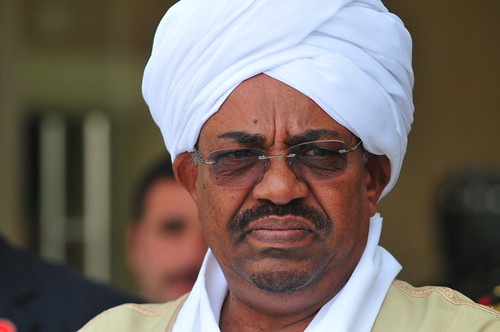 The Obama administration’s special envoy to Sudan, Scott Gration, hinted that Washington will temporarily overlook the International Criminal Court (ICC) arrest warrant for Sudanese President Omar Hasan Al-Bashir in order to keep him at the negotiating table. “Right now President Al-Bashir is the president of the country and we have to work with him to solve those issues that are facing the people [of Sudan],” said Gration, though he qualified his statement noting that there would be eventual justice for the controversial leader. The ICC arrest warrant accuses Al-Bashir of seven counts of war crimes and crimes against humanity, with a pending eighth charge of genocide still possible. The legitimacy of the warrant suffered a blow this week when all African Union nations, with the exception of Botswana, agreed not to arrest Al-Bashir if he visits—putting them in direct contradiction of a central mandate for all states party to the Rome Statute (which set up the ICC). Gration is scheduled to begin a 10-day tour of Sudan next week, though he is not expected to meet Al-Bashir.
The Obama administration’s special envoy to Sudan, Scott Gration, hinted that Washington will temporarily overlook the International Criminal Court (ICC) arrest warrant for Sudanese President Omar Hasan Al-Bashir in order to keep him at the negotiating table. “Right now President Al-Bashir is the president of the country and we have to work with him to solve those issues that are facing the people [of Sudan],” said Gration, though he qualified his statement noting that there would be eventual justice for the controversial leader. The ICC arrest warrant accuses Al-Bashir of seven counts of war crimes and crimes against humanity, with a pending eighth charge of genocide still possible. The legitimacy of the warrant suffered a blow this week when all African Union nations, with the exception of Botswana, agreed not to arrest Al-Bashir if he visits—putting them in direct contradiction of a central mandate for all states party to the Rome Statute (which set up the ICC). Gration is scheduled to begin a 10-day tour of Sudan next week, though he is not expected to meet Al-Bashir.
Four employees of Anglo-Australian mining company Rio Tinto have been detained in China for allegedly stealing state secrets. Chinese media sources reported today that the employees, one Australian and three Chinese nationals, bribed Chinese executives from several companies in order to obtain confidential information on Beijing’s position in international iron-ore price talks. A “vast amount of irrefutable evidence” cited by Shanghai officials alleges that the Rio Tinto employees were intent on “gravely harming China’s economic interests and economic security.” The arrests come a month after Rio Tinto declined a $19.5 billion investment offer from a state-owned Chinese metal firm, raising suspicion that the arrests were in retaliation for the rejected deal. (Rio Tinto executives nixed the Chinese investment offer, fearing that it would have given Beijing too much control over Australian natural resources). China is Australia’s second-largest export customer, and last year, iron ore comprised more than half the revenues of Australian exports to China.
 “Unity in Diversity” reads the motto on a new coin given to G-8 leaders on Friday, a sample of a possible new global reserve currency that would replace the U.S. dollar. Although a transition is not imminent, several nations’ leaders backed the idea of a shift. Indeed, French President Nicolas Sarkozy asked rhetorically, “Shouldn’t a politically multipolar world correspond to an economically multi-currency world?” Although faith in the dollar has remained strong among actual investors, global financial ministers warn that growing U.S. debt increases the risk of instability. Chinese officials in attendance at the G-8 conference have been particularly vocal in their support of the idea. But some say Beijing’s true motive may not be global stability but rather self-protection. With an estimated 70 percent of Chinese reserves in U.S. dollars, Beijing fears that inflation in the United States would substantially decrease the value of China’s holdings.
“Unity in Diversity” reads the motto on a new coin given to G-8 leaders on Friday, a sample of a possible new global reserve currency that would replace the U.S. dollar. Although a transition is not imminent, several nations’ leaders backed the idea of a shift. Indeed, French President Nicolas Sarkozy asked rhetorically, “Shouldn’t a politically multipolar world correspond to an economically multi-currency world?” Although faith in the dollar has remained strong among actual investors, global financial ministers warn that growing U.S. debt increases the risk of instability. Chinese officials in attendance at the G-8 conference have been particularly vocal in their support of the idea. But some say Beijing’s true motive may not be global stability but rather self-protection. With an estimated 70 percent of Chinese reserves in U.S. dollars, Beijing fears that inflation in the United States would substantially decrease the value of China’s holdings.
Negotiations on the return of deposed Honduran President Manuel Zelaya are in peril after interim leader Roberto Micheletti abandoned mediated talks with Costa Rican President Oscar Arias. Although Zelaya and his rival were expected to meet face-to-face during the Costa Rican talks in the capital of San Jose, Micheletti departed early. Arias, a Nobel Peace Prize winner, has appealed for more time to resolve the Honduran crisis citing “very different positions [that] require patience.” Since the coup, Washington has severed military ties with the Honduran armed forces and the World Bank has frozen credit lines to the nation. On Sunday, Zelaya attempted to return to Honduras aboard a plane provided by Venezuelan President Hugo Chávez, but was unable to land due to a military blockage of the airport runway. Outside the airport, pro-Zelaya demonstrations raged and at least one protester was killed. The Honduran Supreme Court, which sparked the constitutional crisis and coup, recently stated that Zelaya could return to Honduras without facing an arrest warrant (if the Honduran legislature grants him amnesty), an indication that a deal may be brokered in the near future.